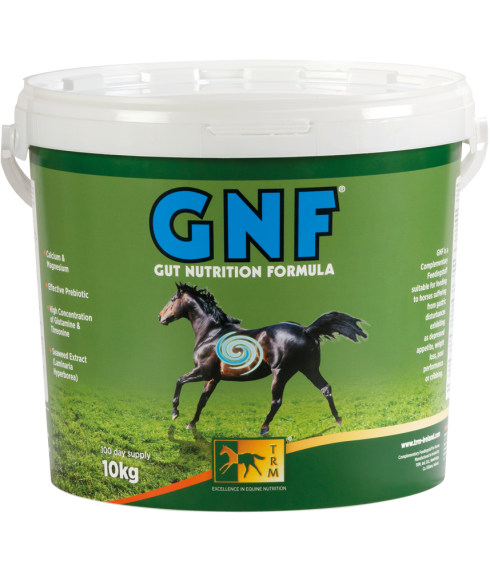GNF Pellets for Horses is a unique supplement, for daily feeding to horses prone to gastric disturbances. GNF will assist in maintaining optimum gut health and function, allowing maximum utilisation of feed.
GNF supplies a unique formulation of probiotics, amino acids, seaweed extract and specific minerals necessary to aid in the recovery and maintenance of a healthy digestive tract. The easy to feed pellet contains essential minerals Calcium and Magnesium, specific amino acids Glutamine and Threonine in high concentrations, prebiotics which are a feed source for beneficial bacteria, and a seaweed extract rich in amino acids and essential nutrients.
Feeding Instructions:
All horses: Feed 50 g twice daily.
Ponies and foals: Feed 25 g twice daily.
3kg = approx 30 days; 10 kg = approx 100 days
Composition:
Calcium Carbonate 20%, Fructo Oligosaccharides 10%, Magnesium Hydroxide 10%, Seaweed Meal (Luminaria Hyperborea) 10%, L-Glutamine 3.8%, Additives – Kaolin 15000mg, Threonine 4720mg
Analytical Constituents:
Calcium 8.47%, Magnesium 4.17%
Key Ingredients:
GNF contains both calcium and magnesium which are recognised as alkaline providers, and have been shown to increase intestinal mucosal integrity (Wang, 2000).
Seaweed Extract (from Laminaria Hyperborea)
Creates a floating raft of gel which helps to protect the non glandular part of the stomach from acid.
Fructo-oligosaccharides (FOS)
Classified as prebiotics (Mikkelsen and Jensen, 2004); substances that are recognised to stimulate growth of desirable bacteria (Kapiki et al., 2007), which can result in a positive symbiotic relationship between bacteria and host (Gibson and Roberfroid, 1995).
Form a food substrate for the beneficial bacteria in the hind gut.
Fructooligosaccharides can remain available as substrates for microbial populations to utilise, and thus promote increased intestinal efficiency
Glutamine
An important amino acid for repair of epithelial cells.
Glutamine supplementation has proven to increase intestinal performance (Yan and Qiu-Zhou, 2006), and has been found to decrease over-expression of pro-inflammatory genes, thus leading to a reduction in intestinal damage of rats receiving acetic acid supplementation (Fillmann et al., 2007).
Threonine
Is an essential amino acid and studies have shown that restriction of this nutrient may limit intestinal mucin synthesis and reduce gut barrier function (Hamard et al., 2007;Faure et al., 2005)
Laminaria hyperborea
Is a brown kelp or seaweed that has been found to be extremely palatable and provide increased digestible energy sources for sheep kept on the Orkney island of North Ronaldsay (Hansen et al., 2003).
L. hyperborea contains higher amounts of vitamins, minerals and proteins, when compared to conventional vegetable sources (ibid.)
Weight: 3 kg


Reviews
There are no reviews yet.